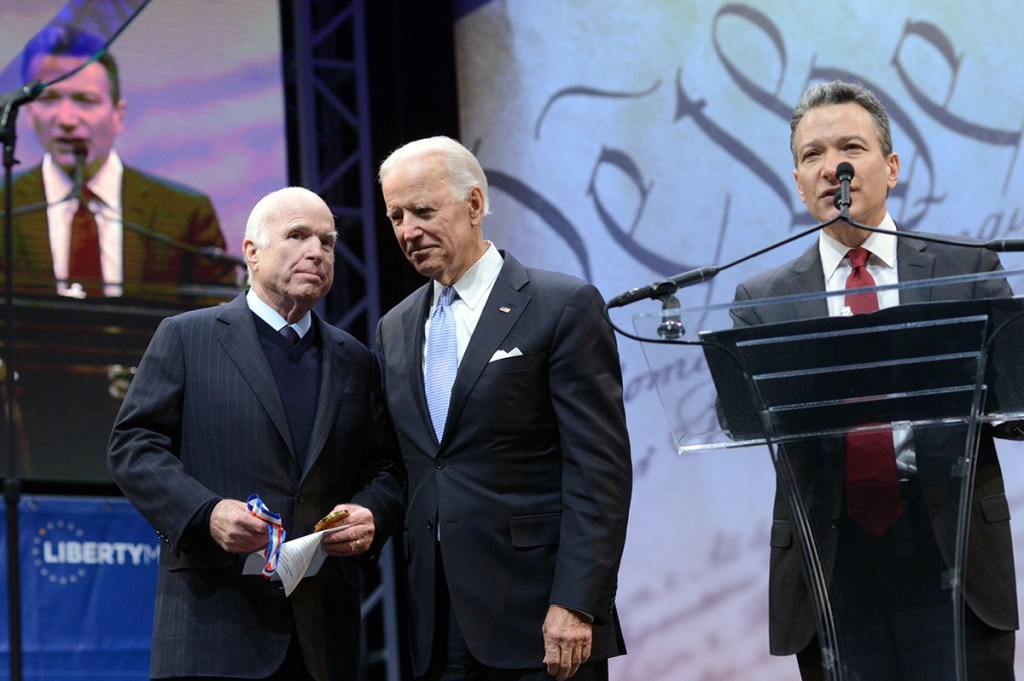Every now and again, some poor sap gets it into his head that he’s going to write the great Washington society novel. The results are rarely good — arguably the last success was Henry Adams’s Democracy (1880) — in part because the stories always draw upon the same ideas. There’s the clique of scheming senators and congressmen, gliding around spouting epigrams at each other while ruthlessly trying to consolidate their power. There’s the lone Brit, usually an ambassador, who’s a less clever observer of American life than he thinks. There’s the mistaken assumption on the part of the author that bureaucracy and cocktail parties are in any way interesting, which usually proves fatal for the work as a whole.
Yet more than anything, what these novels have in common is a focus on friendship — family, too, but friendship especially. That can mean fake friendship for political gain; it can also mean genuine friendship tested by disagreement. Whatever the case, Washington emerges looking more like an aggregate of its relationships than the bastion of some principle or PAC or party line. The reason being that this is how it used to be. Most of these aspiring Swampfires of the Vanities were written well before the age of modern media (back when people used to do things like write novels). It was a different Washington then, one in which friendships played a greater role than they do today.
This is what makes Joe Biden, supposedly the Democrats’ vanilla option, so interesting. More than any presidential nominee since John McCain, he hearkens back to that more decorous era. Biden entered the Senate in 1973. For historians of congressional clubbiness, that was after Sen. Everett Dirksen was keeping a clock in his office on which every number was a five, but before Sens. Ted Kennedy and Chris Dodd were cruising around town like two rakes in a buddy comedy. This was the age of New England Irish eminences like Dodd and Kennedy, of Southern good ol’ boy segregationists like James Eastland of Mississippi and Herman Talmadge of Georgia. And those were just the Democrats.
That whips had to keep in line such different personalities shows how tricky legislating could be. The political parties weren’t yet organized into coastal elites and deplorables, but they also weren’t still divided along Reconstruction lines of North and South. Within each coexisted a hodgepodge of opinions and regional interests, with amiability often the only common denominator. Also, whiskey. ‘I suspect,’ Sen. Talmadge once wrote, ‘alcoholism is as much of an occupational disease among politicians as black lung is among coal miners.’ He was speaking from personal experience: in 1979, he admitted publicly to having a drinking problem. Dirksen, meanwhile, was known for plying obstinate holdouts with booze.
This more genial Washington helped ratify some of the most consequential legislation of the 20th century. It’s largely gone now and for largely understandable reasons. Yet it’s also essential if you want to understand Joe Biden, a man from the ancien régime struggling to adapt to the new order.
When Biden first arrived in the Senate, there was still that handful of Democratic segregationists representing the old South. Determined to pass legislation and advance his fortunes within the party, he ended up working with Eastland and Talmadge, both choleric racists. Elected under Jim Crow, the pair loudly opposed the Civil Rights Act of 1964, signed into law by their fellow Southerner, President Lyndon Johnson. Talmadge was so incensed that he boycotted the Democratic National Convention that year. When the Mississippi Freedom Democratic party, an integrated caucus that included blacks, demanded representation at the convention, Eastland counseled Johnson to ignore them.
Alas, Biden wanted a seat on the Senate Judiciary Committee and atop its perch sat the powerful Eastland. Their first encounter hadn’t gone well. During a caucus meeting, Biden had spoken up in favor of public funding of political campaigns, drawing a rebuke from Eastland, who had threatened to make him ‘the youngest one-term senator in the history of America’. Yet Biden was eventually able to curry favor, and he got his committee slot. Eastland even agreed to come to Delaware to campaign for the young Biden’s reelection, pledging to stump ‘for ya or against ya’, whichever would help more.
Biden also cultivated friendships among Republicans. The snuggest was with Sen. John McCain. Biden met McCain when he was still a captain in the Navy and charged with taking congressional delegations overseas. One evening on just such a junket, McCain ended up dancing on a table with Biden’s wife, Jill, which Biden inevitably found amusing. He later encouraged McCain to run for office. McCain did and won. The two then struck up a senatorial friendship that weathered decades of partisan hailstorms, including the 2008 presidential race, which saw McCain at the top of the GOP ticket and Biden as Barack Obama’s veep.
So strong was their camaraderie that during their last meeting before his death, McCain requested that Biden give a eulogy at his funeral. The resulting address, which Biden was unable to deliver without tearing up, saw him once again waxing nostalgic about the Senate of yore. ‘They look at him as if John came from another age,’ Biden said, ‘because he lived by a different code, an ancient, antiquated code where honor, courage, character, integrity, duty mattered.’ For McCain, Biden declared, party politics weren’t of paramount importance, only ‘the underlying values that animated everything John did’. It’s worth pointing out that Biden also struck up a friendship with McCain’s strongest legislative ally, Sen. Lindsey Graham.
Was Biden schmoozing or surviving in a Senate where relationships were key if you wanted to climb the ladder? Probably a little of both. Still, there is an authentic affability about him that makes those all-important friendships seem like second nature. I used to think Biden was being cheeky when he referred to his Democratic primary opponents as ‘my friend’; now I wonder if it’s more tic than affectation.
What happened? Where did this more genteel Congress go? The simple answer is that the political consensus it undergirded became intolerable. The war in Iraq was a quagmire, two major education overhauls failed, the national debt spiked and health costs spiraled. After the economy crashed in 2008, the public began to question what exactly all this comity was buying them. And when the government bailed out the big banks, all the mugging and backslapping seemed the privilege of an elite determined to protect its own. One by one, the boys left town: Biden ascended to the vice presidency, Ted Kennedy died, Chris Dodd retired amid allegations that he’d gotten a sweetheart mortgage deal. Eastland had passed away back in 1986; Talmadge in 2002.
In their place rose a new generation, less concerned with esprit de corps than with rumbling the failed status quo. This was the Tea Party class of 2010 and, led by Sens. Rand Paul and Ted Cruz (elected two years later), they quickly set about bucking the upper chamber’s norms. Talking filibusters were staged and the budgeting process was jammed. Earmarking, the practice of bribing lawmakers into voting for legislation by attaching unrelated expenditures on special projects in their districts, was banned (at least officially). The machinery of comity filled with wrenches. McCain and Graham, once revered for their bipartisanship, were now the enemy, effigies of a system that had failed.
All the while, the incentives for senators were changing. Once, advancement had meant appealing to the Senate’s powerful gatekeepers. Now, there was a new player in town: the mass media, a vast galaxy of cable news outlets, podcasts and YouTube channels, along with, of course, Twitter and Facebook. No longer confined to C-SPAN and stuffy newspaper articles, lawmakers could now achieve mainstream visibility, which often proved more tempting than even a plum committee assignment. A new breed of legislator was born, one chemically addicted to the sound of his own voice. Picture Rep. Adam Schiff all but managing the Russia investigation from MSNBC, and you understand the starkness of the shift.
The Senate and House floors became a kind of media platform unto themselves. You could go there and give a blazing speech that broke with all decorum, then watch video of it go viral, which would get you invited on Fox News, which would increase your Twitter followers. Who needs friends when you can have a million retweets?
Expanding your media profile also helped you amass that other emerging currency of postmodern politics: money, which after the Citizens United case was pouring into Washington. And while this hardly transformed every legislator into a self-promoting and antisocial mouth-breather — stories still abound of members palling around and slumming together in Capitol Hill row houses — it has made the kind of cross-partisan friendships that Biden once enjoyed more difficult and less important.
As Biden himself put it, ‘Today you look at the other side and you’re the enemy. Not the opposition, the enemy. We don’t talk to each other anymore.’ Sally Quinn, widow of former Washington Post editor Ben Bradlee and once the queen bee of the city’s party circuit, lamented this change in an essay back in 2012. ‘In the past,’ she wrote, ‘we might have attended five-course dinners a couple nights a week, with a different wine for each course, served in a power-filled room of politicians, diplomats, White House officials and well-known journalists.’ No longer, she said, as hostilities had risen and wealth had displaced rank. Quinn was mocked for sounding like a modern-day Marie Antoinette in that piece, and she did. But she also had a point, and it matters.
Joe Biden is a product of that older code of manners, a tradition conservatives used to support. Yet amid all the nostalgia, it’s also important to remember that the Tea Party had a point. Comity had come to trump policy and disaster ensued. Consensus became more important than success. Democrats backslapped Republicans, sending tremors throughout the country.
Among the many bipartisan debacles that Biden supported were the calamitous war in Iraq, the failed No Child Left Behind education reform and the debauching of the student loan system back in the 1970s and ’80s. He later presided as vice president over the Obama administration’s senseless wars in Libya and Yemen, the slowest economic recovery since the Great Depression and a throttling of the federal budget that added trillions to the national debt. He probably thinks it’s wonderful that he and Lindsey Graham once enjoyed lunches together; our maimed veterans and debt-saddled graduates may be less enthused.
Yet it’s also true that the new social arrangement in DC has made it impossible to change course. With everyone playing to their political bases and bipartisanship radioactive, Congress has gone limp, wallowing in pointless and preordained melodramas rather than solving actual problems. Biden needs to go, no question, and a new generation needs to step up. But that generation might also consider his example. There are worse things than conversing with the enemy over a little whiskey.
This article is in The Spectator’s April 2020 US edition.


















